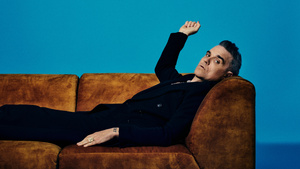Robbie Williams has posted an open letter to original Take That manager Nigel Martin-Smith after they both appeared on an episode of the new BBC documentary ‘Boybands Forever’.
He pushes back at the suggestion that he has blamed Martin-Smith for his struggles with drug addiction, but urges the manager to show some “contrition” about the fact that he - like much of the music industry - often failed to consider the negative impact boy band superstardom has on the young members of those groups.
In particular, he responds to comments made by Martin-Smith in the documentary to the effect that Williams was “smart and quite clever” to blame his drug taking on being “in this band where he couldn’t have girlfriends or couldn’t go out”. Williams, he said, had often presented Martin-Smith as the “evil” manager who was responsible for the singer behaving like a “wanker” when Take That were at their peak.
In his response addressing Martin-Smith, Williams is clear that “my drug taking was never your fault”, adding “my response to the warped world that surrounded me is solely my own”. On his challenges dealing with addiction, he goes on, “it’s part of my makeup and I would have the same malady had I been a taxi driver. I just got there quicker due to having the finances whilst trying in vain to counteract the turbulence of pop stardom’s matrix-bending washing machine”.
However, he says, “if you are following the story closely you can’t help but notice a pattern emerge. Boys join a boy band. The band become huge. Boys get sick”. He then lists the personal challenges each of his Take That bandmates faced during or after their time in the group. Referring to boy bands more generally, he says some boy band members are “fortunate through a series of self-examinations and help to overcome their experience, some never quite manage to untangle the mess of the wreckage of the past”.
Elsewhere in his open letter, he commends Martin-Smith’s business savvy, the risks he took to get Take That off the ground and the opportunities the boy band provided Williams. He also admits that in the past he has been “mean, callous and unkind” to his former manager and bandmates.
However, he adds, when he was struggling to deal with the stresses of pop stardom that came with being in Take That in the 1990s, the support he needed wasn’t forthcoming. “Nearly all members of boy bands, it seems, have at some point a mental breakdown”, he goes on. “Your young charge at this time in his life was experiencing his first. You didn’t excel in ‘man management’ and it was here that, instead of a stern word and a pointed finger, an arm around the shoulder and a kind word would have been the best tact”.
Contrasting his time in Take That with his solo career, working with management firm ie:music, he says, “I am proud to say I have been with the same management for nearly 30 years now - how it worked is, if ever there was a whip to crack, it always came from a kind hand”.
“You would have had the brain to have guided my solo career but, alas, not the heart”, he muses. “It could all have been so different. But we were all much younger then”.
Which brings us back to now and the comments made by Martin-Smith in the BBC programme that prompted the open letter. Williams would be happy, he says, if Martin-Smith said something along the lines of, “the level of success was new to us all - I wish I knew then what I know now - I could have been there for them on a level that, in hindsight, maybe I wasn’t”.
“Everyone will understand and appreciate that level of self-reflection”, Williams reckons. “No one is going to sue you for not knowing or understanding the psychological effects everything was having on everyone. We were outliers”.
Concluding on that point, he urges Martin-Smith to, “just concede a few points here and there, cos no-one’s gonna buy the version of perfection and upright behaviour that is your current MO”. People will be more understanding, William argues, if “you see your own part in situations” and “show contrition”.

